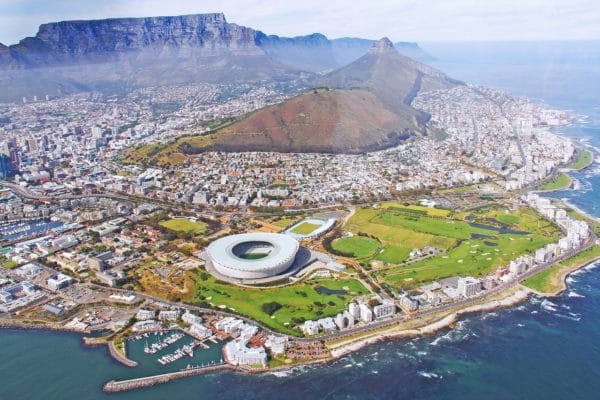Examining Africa’s Growing Economy and Business Opportunities
Over the last two decades, Africa’s economy, population, and foreign engagement have all grown tremendously. Countries around the world have taken notice … Continued

Over the last two decades, Africa’s economy, population, and foreign engagement have all grown tremendously. Countries around the world have taken notice and began strengthening their ties with African nations. According to The Economist, more than 320 foreign embassies opened throughout the continent between 2010 and 2016 – one of the largest spikes of this kind. The United Nations estimates that Africa’s population will outnumber China’s by 2025. This population influx not only expands the pool of potential customers for businesses in Africa, but also potential employees to help sustain and augment operations.
As Africa has grown, so has its economy. Foreign investments, innovation and business opportunities all have followed, making it a top destination for organizations looking to expand their interests abroad.
What is fueling Africa’s prosperity?
“Africa is becoming less violent, less volatile and less politically constrained,” Stephen Ozoigo, CEO of African Technology Foundations, is quoted saying to PBS. “[Africa] is participating in globalization, so the policies of the future should be written with Africa in mind.”
From new educational resources and co-working spaces to billion-dollar companies investing in startups and programs, the stage has been set for Africa’s exponential growth, leading to more opportunities every day.
Here are a few key drivers supporting its burgeoning economy.
There is an increasing number of tech hubs throughout Africa.
According to the GSMA Ecosystem Accelerator, there were 442 tech hubs (i.e., communities that foster innovation and support tech startups) across Africa in early 2018, a more than 50% growth from two years prior.
Over half of Africa’s tech hubs are located within South Africa, Kenya, Nigeria, Egypt and Morocco, but more and more are spreading to remote regions of the continent. Based on the tremendous achievements they’ve already made, many believe these hubs are the future of Africa. While they’re laying a foundation for broad-scale innovation and economic advancement, they’re also revolutionizing thousands of communities, having a profound impact on individuals’ lives.
Global tech giants and companies are investing in Africa.
Many of the tech hubs mentioned above are supported by global tech giants like Google and Facebook, subsequently leading to more attention and support from other leaders in the industry. Tech destinations as far as Silicon Valley are heavily investing in Africa’s startups and overall economy.
For example, the African Technology Foundation, based in Palo Alto, California, has been working to connect African technologies with the experts of Silicon Valley, in an effort to show the world what Africa’s young, like-minded entrepreneurs are capable of creating, according to PBS. The nonprofit is connecting its recipients with other nations, like Sweden, for its gender empowerment initiative.
U.S. investment firm Goldman Sachs applied for a South African banking license, which would allow it to heavily increase their involvement with the country’s foreign exchange and capital markets, according to The Business Maverick.
Most recently, Facebook has announced plans to help connect more of Africa to its platform. The social media company plans to develop an underwater data cable that would encircle the continent, allowing more users to sign up and connect.
Artificial intelligence is growing in Africa.
Despite African countries being relatively new to the global tech scene, artificial intelligence (AI) has significantly impacted African markets over the last few years. Achievements from African researchers, many of whom were once not welcomed to collaborate at global conferences, are gaining international notoriety.
In the last two years, several developments have given African countries further AI-related opportunities.
- In April 2019, Google opened its first African AI research center in Ghana, where its laboratory will be used to develop solutions to help improve health care, agriculture and education.
- In an effort to increase AI education and opportunities for young African researchers, the African Institute for Mathematical Scientists (AIMS), located in Rwanda, is currently running a one-year program where scientists and innovators across the continent are being trained in machine learning, BBC reports. The one-year master’s degree program is a partnership between AIMS, Facebook and Google.
Growing tech hubs, thriving startups, and international investments all are powering and creating opportunities across Africa, drawing global talent to relocate there.
Considerations to Make When Relocating Employees to Africa
While the above makes the prospect of moving to Africa sound exciting and full of opportunity, there are still some hurdles that come with working in countries (and a continent) that isn’t fully developed. Whether relocating for a new job or an investment opportunity, here are four things to consider ahead of making the move.
Immigration processes
There are varying visa requirements from country to country, and applying for a temporary work or residence visa can be challenging.
In South Africa, there are eight types of temporary residence visas, such as a general work visa, spousal/life partner visa, and a critical skills work visa, all of which are generally valid between one and five years. There also are several restrictions, and visa applications take anywhere from four to eight weeks to be processed. In Uganda, plan to apply for an extended multiple-entry visa if you plan to relocate for more than three months. Single-entry visas are only valid for up to three months.
Be sure to continually check the process for obtaining a work or temporary residence visa well ahead of your move. Because many African countries are subject to political uncertainty, visa requirements can change overnight.
Cultural training
There are between 1,500 and 2,000 languages spoken in Africa, as well as thousands of cultures, tribes and villages. Suffice it to say, there are seemingly endless languages, nationalities and customs to learn. In Kenya alone, a country about the size of Texas, there are about 13 ethnic groups. Ghana, a country about twice the size of New York, has more than 100.
There are several organizations that offer cultural training to support expats living and working in African countries, including the following:
- Global Training Partners offers training in Nigeria, South Africa, Ghana, Angola, Kenya and Mozambique.
- Relocation Africa Group assists individuals and corporate clients who are settling their relocated families and employees across the continent.
- Communicaid offers a cross-cultural training course for living and working in South Africa, as well as a course on how to work effectively with peers of various international backgrounds.
- Destination Management Services, offered by UniGroup, provides a range of cultural and language training as part of its packaged services.
Safety and security
When traveling anywhere abroad, safety is a top priority. While hundreds of cities are developing and rapidly improving as tech hubs and businesses grow, there still are several African countries with high travel advisory rankings. For example, Algeria is considered to be a “Level 2” travel advisory due to terrorism, and Libya has a “Level 4” travel advisory, the highest level, due to high levels of crime, terrorism and armed conflict. You can find the latest travel warnings and more about the travel advisory rankings here.
The best way to stay safe is to be well informed of basic safety tips, know what to do if you’re a victim of a crime, as well as how to avoid cons and scams and other potential threats.
Financial preparation
It is estimated that rent and food in Africa are 55% and 35% more expensive, respectively, than in comparable cities around the world. Harare, Zimbabwe, has the highest price index in the continent, followed by Port Louis, Mauritius, and Pretoria, South Africa, according to Expatistan.
Like any relocation, it’s important to be informed of all the aspects of an international move. By researching safety tips and precautions, costs of living, immigration procedures, and the diverse culture, relocating professionals will have a better experience abroad.
More than ever, it is a great time to consider this move. African communities and cities are thriving. Tech hubs, innovation, new ventures, and job opportunities are putting Africa on the map, and the continent is home to some of the most beautiful landscapes and wildlife in the world.
If you’re relocating, or simply just considering a move to Africa, and have questions about the process, don’t hesitate to contact us.


